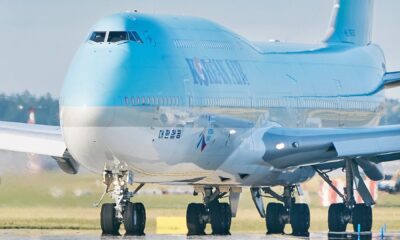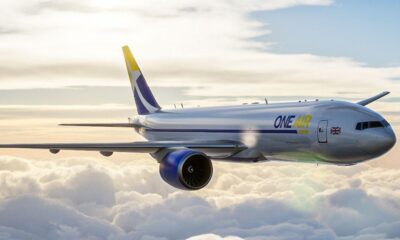Business
New Aircraft Set to Replace Iconic Boeing 747 Freighter
The iconic Boeing 747 freighter, known as the “Queen of the Skies,” is gradually being replaced by a new generation of more fuel-efficient aircraft. As the aviation industry increasingly prioritizes sustainability and operational cost-effectiveness, models like the Boeing 777F, Boeing 777-8F, and Airbus A350F are emerging as preferred choices for air cargo operations. This shift reflects broader trends in the industry, addressing rising environmental concerns and the growing demand for efficient logistics solutions.
The Legacy of the Boeing 747 Freighter
The Boeing 747-400F and Boeing 747-8F have been fundamental to global air cargo for decades. Their enormous capacity and unique loading capabilities have made them indispensable for transporting oversized freight. Carriers such as Lufthansa Cargo and Air Bridge Cargo have relied on the 747’s design to maximize volume and flexibility. Despite its impressive operational history, the 747 freighter faces increasing challenges.
As operational costs rise due to fuel prices and maintenance complexities, the four-engine 747 models are becoming less viable compared to modern twin-engine alternatives. The Boeing 747-8F, the final variant in the 747 series, boasts improved engines and avionics. However, its efficiency pales in comparison to newer aircraft.
Emerging Alternatives in the Cargo Market
The Boeing 777F has become a key player in replacing the aging 747-400F. Introduced more than a decade ago, the 777F offers significant payload capacity and extended range, making it an essential component for many airlines. Leading carriers like Emirates and Silk Way West are expanding their fleets with 777Fs, highlighting the model’s efficiency. Recent reports indicate Emirates is considering further options, including the upcoming Boeing 777-8F and Airbus A350F.
The 777-8F, part of Boeing’s latest series, promises an even greater payload capacity of 112.3 tonnes and improved fuel efficiency. Qatar Airways has already placed orders for 34 units, signifying strong market confidence. Although Boeing’s delivery schedule has faced delays, the demand for the 777-8F indicates it will play a crucial role in future cargo operations.
Meanwhile, Airbus is also stepping up to meet market demands with its clean-sheet design, the A350F. This new freighter model promises at least a 20% reduction in fuel consumption and CO2 emissions compared to existing freighters. The A350F features the largest main-deck cargo door in its class, streamlining loading processes. Airbus celebrated a significant milestone with the completion of the first A350F wingset in March 2025, with prototypes expected to undergo flight testing in 2026 and 2027.
Comparative Analysis of Key Aircraft
A comparison of the Boeing 747-8F, 777F, 777-8F, and A350F reveals the shifting landscape of air cargo. The 747-8F, while still a capable aircraft, is significantly less efficient than its twin-engine counterparts.
– **Boeing 747-8F**: Max revenue payload of approximately 134,000 kg, range of 4,120 nautical miles.
– **Boeing 777F**: Structural payload of 107.0 tonnes, range of 4,970 nautical miles.
– **Boeing 777-8F**: Projected payload of 118.2 tonnes, range of 4,410 nautical miles.
– **Airbus A350F**: Max payload of approximately 111,000 kg, range of 4,700 nautical miles.
The Boeing 777F has proven itself as a reliable workhorse, while the 777-8F and A350F are poised to set new standards in efficiency and environmental responsibility. The 747-8F remains in limited use, primarily in niche markets, but its dominance is clearly waning.
As the air cargo sector evolves, the transition from the 747 freighter marks a significant shift toward more sustainable and economically viable solutions. With the delivery schedules for the 777-8F and the A350F coming into focus, the future of air cargo will likely be characterized by twin-engine, technologically advanced aircraft. For the industry, this evolution signifies a move towards fleets that prioritize agility, efficiency, and reduced carbon footprints, responding to the demands of modern logistics and a changing climate.
-

 Entertainment3 months ago
Entertainment3 months agoAnn Ming Reflects on ITV’s ‘I Fought the Law’ Drama
-

 Entertainment4 months ago
Entertainment4 months agoKate Garraway Sells £2 Million Home Amid Financial Struggles
-

 Health3 months ago
Health3 months agoKatie Price Faces New Health Concerns After Cancer Symptoms Resurface
-

 Entertainment3 months ago
Entertainment3 months agoCoronation Street’s Carl Webster Faces Trouble with New Affairs
-

 Entertainment3 months ago
Entertainment3 months agoWhere is Tinder Swindler Simon Leviev? Latest Updates Revealed
-

 Entertainment4 months ago
Entertainment4 months agoMarkiplier Addresses AI Controversy During Livestream Response
-

 Science1 month ago
Science1 month agoBrian Cox Addresses Claims of Alien Probe in 3I/ATLAS Discovery
-

 Health4 months ago
Health4 months agoCarol Vorderman Reflects on Health Scare and Family Support
-

 World2 weeks ago
World2 weeks agoBailey Announces Heartbreaking Split from Rebecca After Reunion
-

 Entertainment4 months ago
Entertainment4 months agoKim Cattrall Posts Cryptic Message After HBO’s Sequel Cancellation
-

 Entertainment3 months ago
Entertainment3 months agoOlivia Attwood Opens Up About Fallout with Former Best Friend
-

 Entertainment2 weeks ago
Entertainment2 weeks agoCoronation Street Fans React as Todd Faces Heartbreaking Choice













